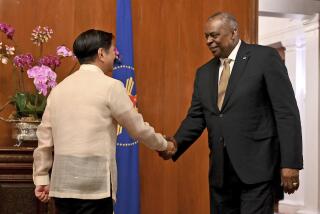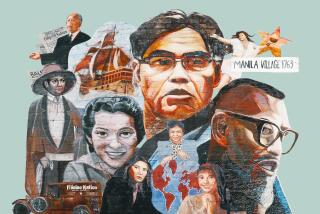International Business : SPOTLIGHT ON THE PHILIPPINES : When Doing Business There ...
- Share via
The Philippines is a developing country with a strong American presense. However, its Asian culture, along with colonial Spanish influence, brings out key differences that U.S. business executives may encounter in their ventures there.
DO:
Make appointments at least a day in advance. Phone calls are fine, but you may be asked to send something on a company’s letterhead--it provides identification. Fax machines are common. In fact, many chief executives have fax connections at home.
Hire lawyers and accountants. The Philippine Bar Association and the Integrated Bar of the Philippines are good sources for local law firms. Others include U.S. international law and accounting firms with affiliations in the Philippines.
Rent cars, but use a chauffeur. In Manila, Avis, Hertz and major rental companies provide them for $80 every eight hours on a mid-size car with mileage limitations. Chauffeur services are useful with the city’s traffic and parking problems. Besides, most taxis are old and unreliable, and meters run up fast with Manila’s traffic congestions.
Expect Philippine executives to work as well as Americans. Many have been trained here, or under comparable systems.
Realize that Philippine banks are generally reliable. They’re centrally regulated. Reputed banks like the Bank of the Philippine Islands have operations in Los Angeles. Citibank and Bank of America also have branches in the Philippines. Note that interest rates are high, with present lending rates ranging from 16% to 20%.
Check with the Philippine Consulate General or the Philippine Trade Office for the latest information on investment laws. New incentives in areas like ownership, taxes and stock offerings have been added or changed specifically to attract foreign investors.
DON’T:
Be offended if someone’s late. Filipinos tend to be a little more flexible with appointment times, so allow about 15 to 20 minutes. However, that norm is gradually changing in Manila and other major cities.
Expect phone connections to work as well when calling outside major cities. Telecommunications is expanding rapidly, and that would change soon enough. Pay phones may not be as widespread, but you can always rent a cellular phone.
Fear taking business disputes to courts. The Philippine judicial system is modeled after the United States, and cases are handled in similar ways.
Rely completely on traveler’s checks. Although accepted at banks and American Express offices, they are not always accepted elsewhere.
Be too blunt. Instead, beat around the bush a little--it’s considered polite. If there’s something you disagree with, do it subtly, but don’t mislead, especially in a business negotiation. Filipinos emphasize hospitality, and will try to accommodate your needs.
Settle for verbal agreements without eventually securing legal contracts. A handshake means a lot, but a signed legal agreement is what stands in court during disputes.
Reject invitations to dinners with families and social events if at all possible. Filipinos value the personal side of business and will consider friendly relationships part of any transaction.
Bribe--it’s against the law. Occasionally, you may be approached for it at airport customs. Ask to see the supervisor instead.
More to Read
Inside the business of entertainment
The Wide Shot brings you news, analysis and insights on everything from streaming wars to production — and what it all means for the future.
You may occasionally receive promotional content from the Los Angeles Times.










